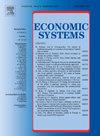What makes environment-related technologies less effective? The role of uncertainty
IF 3.3
2区 经济学
Q1 ECONOMICS
引用次数: 0
Abstract
This study examines the effect of environment-related technologies on environmental quality, conditional on the level of uncertainty. We apply two panel quantile regression approaches to panel data on the member countries of the Organization for Economic Cooperation and Development (OECD) over the period 1990–2015. The empirical results suggest that environment-related technologies and uncertainty both significantly help improve the environmental conditions, although the magnitude of these impacts vary across the level of environmental footprint. Notably, higher uncertainty could negate the beneficial effects of green patents on the environmental footprint, especially in a highly degraded environment. Several preliminary tests, such as cross-sectional dependence, stationarity, cointegration, and nonnormality, provide support for the adoption of panel quantile regression. The significant and heterogeneous relationships between the environmental footprint and its determining factors are also established. This research offers a scientific explanation for the ineffective adoption of environment-related technologies for improving environmental quality in many OECD countries for years and hence has valuable implications for policy makers about leveraging the beneficial impacts of environment-related technologies on the ecosystem.
是什么导致与环境有关的技术效果不佳?不确定性的作用
本研究考察环境相关技术对环境质量的影响,以不确定性水平为条件。我们对1990年至2015年期间经济合作与发展组织(OECD)成员国的面板数据采用了两种面板分位数回归方法。实证结果表明,环境相关技术和不确定性都显著有助于改善环境状况,尽管这些影响的程度在不同的环境足迹水平上有所不同。值得注意的是,较高的不确定性可能会抵消绿色专利对环境足迹的有益影响,特别是在高度退化的环境中。一些初步检验,如横断面相关性、平稳性、协整性和非正态性,为采用面板分位数回归提供了支持。环境足迹与其影响因素之间存在显著的异质性关系。本研究为许多经合组织国家多年来未能有效采用环境相关技术来改善环境质量提供了科学解释,因此对政策制定者利用环境相关技术对生态系统的有益影响具有重要意义。
本文章由计算机程序翻译,如有差异,请以英文原文为准。
求助全文
约1分钟内获得全文
求助全文
来源期刊

Economic Systems
ECONOMICS-
CiteScore
4.90
自引率
0.00%
发文量
83
审稿时长
48 days
期刊介绍:
Economic Systems is a refereed journal for the analysis of causes and consequences of the significant institutional variety prevailing among developed, developing, and emerging economies, as well as attempts at and proposals for their reform. The journal is open to micro and macro contributions, theoretical as well as empirical, the latter to analyze related topics against the background of country or region-specific experiences. In this respect, Economic Systems retains its long standing interest in the emerging economies of Central and Eastern Europe and other former transition economies, but also encourages contributions that cover any part of the world, including Asia, Latin America, the Middle East, or Africa.
 求助内容:
求助内容: 应助结果提醒方式:
应助结果提醒方式:


